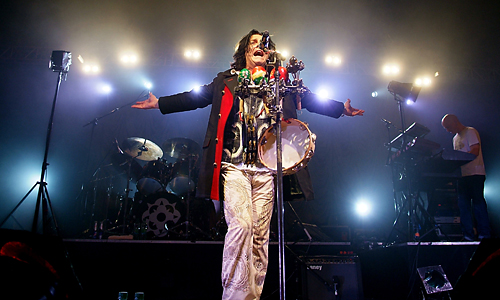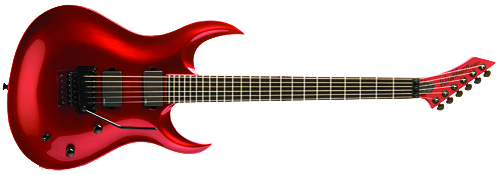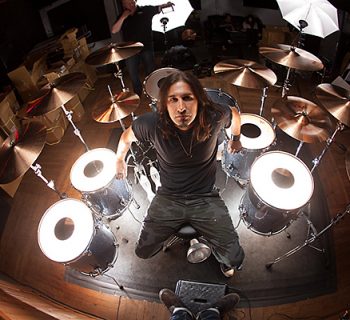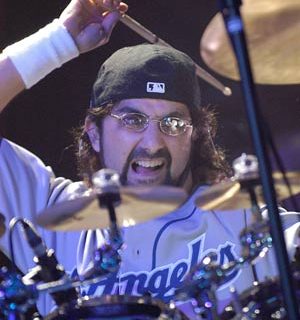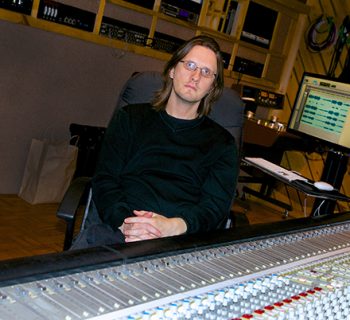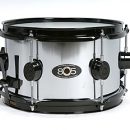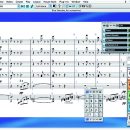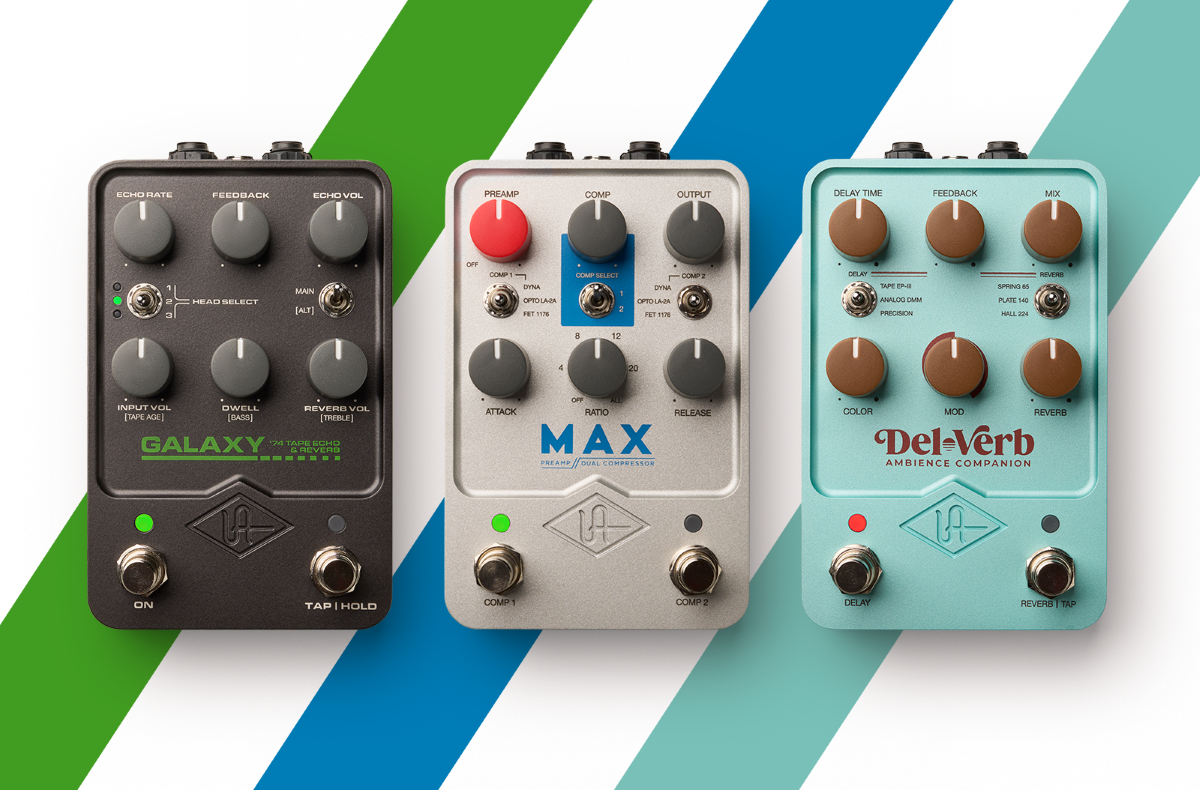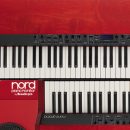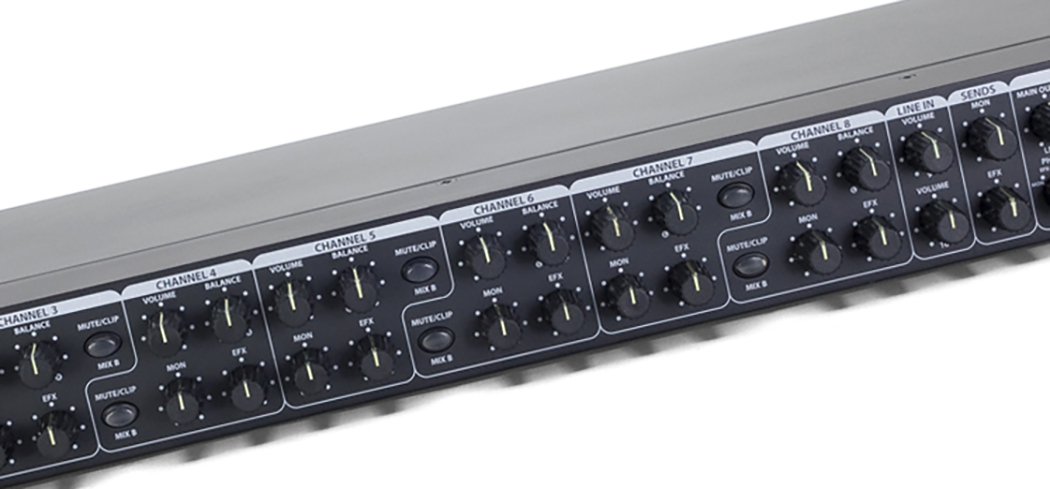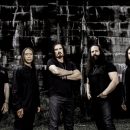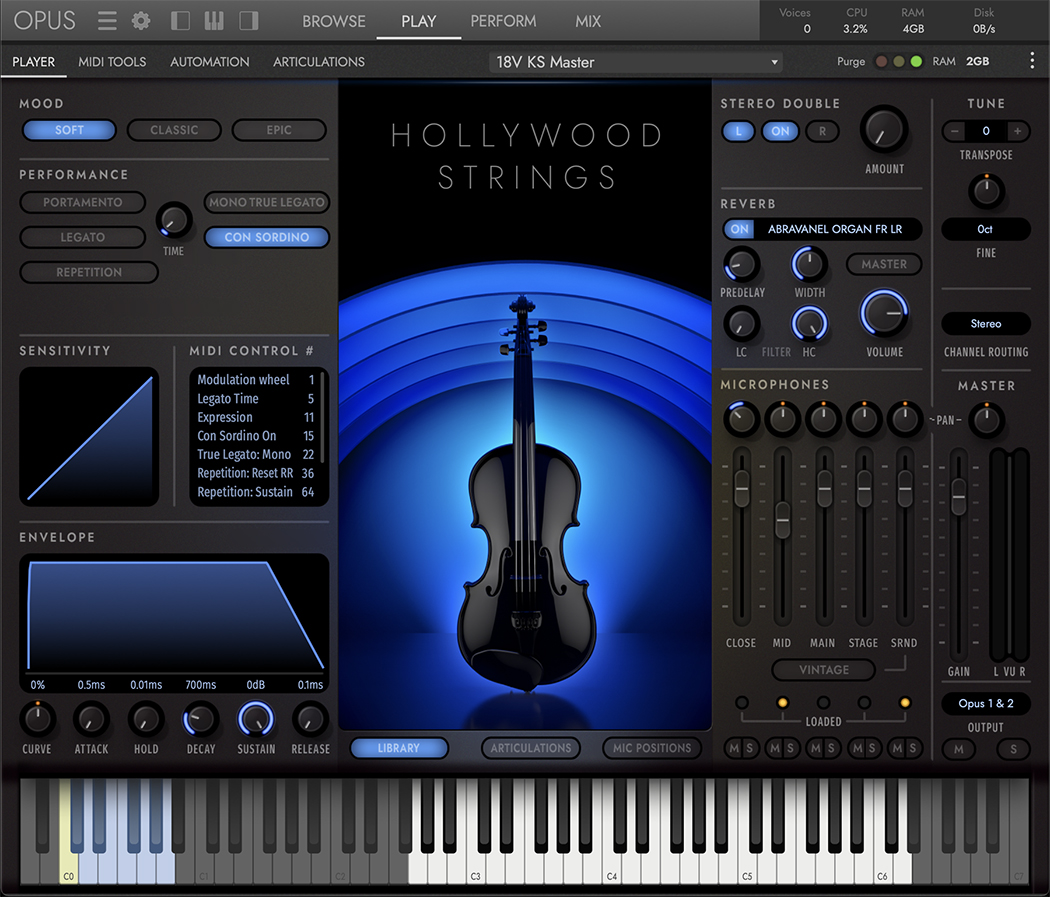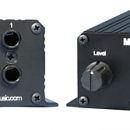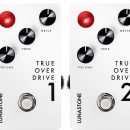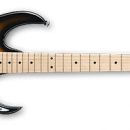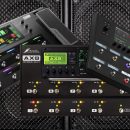You’re always striving not to repeat yourself with every record.
MPc: I just went back and looked at the last interview we did when Somewhere Else came out, and we were talking about how on that record your guitar was pretty dry from the effects perspective. Now you’ve gone wet all over again with the new record — a lot of awesome new guitar sounds.
SR: Aw, gee, thanks. It’s a lot of AdrenaLinn pedal on there. That’s probably the thing that is most important, sort of, to the palette of sounds that I used. Also, my Hughes & Kettner Rotosphere quite a lot for the loopy type sounds and a few things.
MPc: I’ve got to check those pedals out. Because you’ve got just some really, really crazy sounds in there!
SR: It’s the most impressive pedal I’ve ever used, actually.
MPc: Which one, the Rotosphere?
SR: No, no, the AdrenaLinn. The Rotosphere is great if you’re wanting that sort of retro guitar sound. It works really, really well. I prefer it to the Boss one, because this one has actually got a little valve in it, and it’s got a little bit of grit and dirt in the sound, which makes it just sound more realistic to me than the Boss rotary speaker one. But, yeah, the AdrenaLinn, it’s just infinite inspiration. I think it’s a great, great pedal to have.
MPc: Since you went back to that wet sound, Did you go back on this record to playing with your JC-120 and your DS-1 pedal?
SR: No, there’s no JC-120 or DS-1 on there. It is probably the scream channel on the Groove Tubes Trio, although there are a couple of things actually where it’s the main channel on the Trio, less distorted but using a distortion pedal at the front end from Xotic Effects. I’m trying to remember what it’s called. I got the yellow pedal, it’s a bit like a tube screaming thing, but there’s a little bit more bottom end to it. That’s a really great pedal. I love that. If you want a kind of soulful sound that isn’t blazing, it just gives you a bit of extra bite in the sustain. That’s a really cool pedal.
MPc: In general your guitar tones really sound phenomenal on the new record. Tell us a little about your approach to the guitar parts on this one, because it’s really a drastic change from what I was listening to on Somewhere Else.
SR: A lot of this album, especially the longer atmospheric tracks, the initial jams, initial improvisations we had, some of them are actually on the record because everything was recorded into our Pro Tools HD system, so if something magical happened we could craft and use a section of it in the arrangements. [So it was] just really what was happening in the room. You’re always striving not to repeat yourself with every record. If somebody starts throwing a curve, you kind of tend to go with it really in terms of your approach.
And we just have a really organic way of working where if one person is sort of right in the zone and just creating something interesting, everybody is very sensitive to that, and it just sort of merges and grows into something.
MPc: I was talking with “H” earlier, and I was telling him that the new record really found this unique position falling halfway between progressive rock and pop — just the melding of the styles of the songs that came out in this collection.
SR: Yeah, there are a few things that are quite kind of hooky and melodic, especially at the shorter sections that are almost prequels to some of the tracks on the lengthy sections. And I think it’s a really interesting blend. Listening across the two albums there is pretty much something for everyone — not that you can always please everyone all of the time.
But, yeah, I think we’re all very happy with it as an album. I think Mike Hunter did an amazing job. He worked really so hard on this record. We were with him in our studio for the best part of a year. So, yeah, a lot of the credit has to go to him, because he’s a musician as well, because he’s quite a creative guy. I thought he really brought some interesting things up.
I’ve always been the one that’s getting my hands dirty.
MPc: Something I noticed on “Asylum Satellite #1” — you were really chanelling your inner Dave Gilmour.
SR: Yeah. [laughs] [I think I have] a bit of a Dave Gilmour in me, truth be told. Well, it’s just one of those things that kind of gets in there. And I didn’t want to do the really sustaining solo-type thing over it. So I had the Rotosphere pedal with the yellow box, so it was something that had a bit of bite. And I suppose it kind of pushed me in a more bluesy sort of direction, which is a more Gilmour-inspired side of my playing, I suppose. But, yeah, it’s a fun thing to do. I’m looking forward to playing that track live.
MPc: How much of these new albums are you going to take on the road? All of the sudden you released so much... an hour and a half worth of new music. How do you build a set list?
SR: Well, we’re probably going to play about five or six of the new songs each night and vary a little bit. But the tracks that we’re looking at playing are “Essence” and “Happiness is the Road,” “Planet Marzipan,” “Asylum Satellite,” “Thunder Fly,” and “Whatever is Wrong With You.” Those are the songs that we’re endeavoring to polish to a certain point where we think we can play them to people.
MPc: With music like this I’m sure it’s got to be an interesting task after the recording to go back and learn how to physically execute all of the parts you created for the album.
SR: Yeah, well, that’s it. It’s a challenge for me since I’m just starting to learn my own parts, especially when there’s so many songs, because they always start to blur together a little bit as your brain gets overloaded. But it’s starting to come together.
MPc: When I was talking with you or one of your bandmates about the previous album, you guys had actually written a lot of material that didn’t make it on the last album. Did much of that end up becoming songs on this record as originally envisioned?
SR: Yeah, it was probably for one of the two albums in terms of the sort of material we’d already got on the shelf. The original thought was just for this to be a single record, but as we started creating, a lot of really great things started happening, and we thought that the album approach was going to be the way to go. And then a lot of the little things seemed to tie together for the Essence album. It made more sense for the second record to be more of a collection of songs, really. It’s good having those two different sides to what we’ve always done, really, the little concept album and the variety that you get from either approach.
MPc: Are you planning to make any changes to your live rig for when you head out on the road this time?
SR: Yeah — anything I’m using that I haven’t used before. [laughs] Some of my gear has toured an awful lot over the last 29 years. And one of my TC 2290s kept on dying on me on the last tour, so I’m using a thing called the Gig Rig, which is a pedal switching system. It’s a floor switching system that’s got 10 separate returns, I think 12 presets, and assignable outputs — assignable pre and post gain. Lots of clever stuff. And it’s got all sorts of micro-switches, so it’s very easy to program and to see what’s happening. And it sounds phenomenally clean. It’s designed by an Australian guitarist who lives in the UK. And all of the top UK session guys are using them now. The web site is www.thegigrig.com.
MPc: So what are you going to use to replace your 2290 for your delays?
SR: Well, in effect I’ve got two completely different systems. I’ve got the system that goes into the JC-120, which I where I use delay, chorus, different sorts of modulations, into the distortion, into the JC. Then I’ve got my other set-up, which has got another 2290, my Lexicon unit, and various other things — that side is fine. But for the delays, I’m using the Gig Rig for the JC set-up now and the DS-1… It’s one of the Eventide pedals.
MPc: Oh, the new TimeFactor? How do you like that?
SR: Oh. [laughs]
MPc: I sense it’s a mixed bag.
SR: Yeah, I think it’s probably got a lot of potential. I find the way it’s laid out, the operating system, comes across as being designed by a buffoon and not a musician, really, compared to the old set-up that I have for some of the acoustic shows we do. I’ve got one of the Boss delays with the full memories [BOSS DD-20], which is ... I mean, maybe it might not be quite as good? I think there’s not much in it. But it’s so much easier to use.
The Eventide is just lots of multifunction button presses, and it’s almost like there is too much functionality in there for a stomp box. And, yeah, it would really... you’d have to know your way around it before you kind of want to get into editing it in a live situation. [laughs] So I’ve got mixed feelings about it. I think it’s probably got a lot of potential, but I’m just frustrated that they couldn’t make it a little bit more sort of ergonomic and just easier to use in a live context.
MPc: Do you figure out all of your rig hook-ups? Or do you have a tech that works on that with you?
SR: No, I pretty much do that, really. I’ve kind of changed things over the years. But the Gig Rig has been used a lot in one of my other set-ups in my home studio, so I kind of got used to that. And then it’s just hard when you try different ways of incorporating it in the existing touring rig to give me some of the maximum flexibility.
I’ve tried so many different sort of switching systems, and there are various ones. You know what, the TC 2290, although it didn’t have assignable outputs, is still to me the best effect controller ever made in terms of sound quality, ease of use, flexibility. It’s just a shame that they didn’t make a “Mark-2” version of that really for me instead of the G-system.
MPc: Yeah, I’ll tell you, I switched my rig to the G-system, and I’ve actually found that to be the happiest I’ve ever been with just the ease with which it integrates both switching on-board effects as well as integrating pedals through a looping system that I used from RJM Music.
This opens up an interesting topic, and that is something that I’ve thought about. It’s great that you work on your own rig, as do I. But I think some of the guitar players who have techs who totally build and maintain their rigs for them, and just the whole concept of that, sort of frightens me. That you would be so far removed from your equipment that someone else has to configure it and you just play it without really understanding it.
SR: Yeah, no, I’ve never really been of that mind. I’ve always been the one that’s getting my hands dirty. And I think that way you find the best way of doing things to suit you. It’s not necessarily the way that other people might do them. And tone is such a personal choice as well. One person’s great tone isn’t another’s. So you have to be very hands-on, I think, and trust your ears to find the system and the way of doing things that suits how you like to work.
MPc: Very true. So tell me, what are some of your favorite guitar moments on the new album. What moves you when you listen to it?
SR: “Asylum Satellite,” I like. “Train.” “Woke Up” is one of my favorite things. Let’s see. The solo at the end of “Thunder Fly.” Yeah. Those are probably a few of them. I mean, the track itself, “Planet Marzipan,” I really like. It’s got a few things on there.
MPc: There were a few moments on the new record where you guys did some things that really stood out to a longtime Marillion fan, where I had to go and say, “You know, I really can’t place this.” Style-wise, I heard this album falling into the era of Brave and Holidays in Eden, with a touch of the Marbles vibe, but then throwing in a definite Beach Boys’ thing, vocally especially, and then I kept thinking of Pink Floyd’s The Division Bell, while listening to this record.
SR: Yeah, I mean, there are so many little bits and pieces of influences there that it’s quite interesting, actually. I can hear a bit of The Doors in places.
MPc: Oh, well, the opening track on disc two, “Thunder Fly,” — my first reaction was, “Okay, is this The Doors or the Blue Brothers?”
SR: It’s great to have that freedom to do that, really. You risk alienating a percentage of your fans who never want you to take chances and always want you just to try and recreate their favorite album that you’ve made. And we’ve never been about that anyway. So it’s great that you have this freedom to do these things and to throw these curves and to put in these very different influences.
MPc: I think most Marillion fans would agree that you’re the poster children and role models for how to make music on your own terms without the industry and still be successful at it.
SR: Yeah. The fact that we’re still here shows that we’ve been pretty successful. And I think this day and age as the industry is changing so quickly, and all these issues… you have to deal with the consequences of downloading and file sharing and find a way of making a living in an ever-changing world. We’ve done pretty well, I think.
I mean, a lot of that is due to the fact that there are so many thousands of Marillion fans out there that really care passionately about what we do and are more than willing to put their hands in their pocket, even a little, before we give them the record [by pre-ordered CDs before they are even recorded]. So that’s the thing that’s given us such incredible independence and the freedom to try the thing.
But it’s scary. I mean, CD sales have dropped 20 percent in the last year, and the statistics are only five percent of the music that’s downloaded on the Internet is actually paid for. So to kind of have to deal with that in a situation where you rely on the income you generate to continue, to be able to be in a position where you can make another record, it stops being about that dream of being rich. It’s literally a question of survival. But we’re doing pretty well.
MPc: Have you guys felt the decline of CD sales, or do you find that just because of the nature of progressive rock music, and your audience, you’re somewhat insulated from it?
SR: I think we’re probably more insulated from it, but it does suffer, especially in the situation we’re in at the moment with the economic crisis around the world. That’s got to impact your sales. And what we’re doing with this album, I mean, it’s available retail in the states and in Poland but everywhere else’s it’s only available direct from our site, so that’s a little bit of an experiment for us to see how that’s going to work.
And we’re probably going to sell a lot less records because of it, but we’ll make twice as much money. And I think we probably then will put it into retail in three or six months’ time. But it does affect us. It would be silly to pretend otherwise.
Feel the need? The need for Steve? Check out our previous feature story with him right here!


